- Home
- Patricia Highsmith
Suspension of Mercy Page 3
Suspension of Mercy Read online
Page 3
Alicia went to check the roast and the Yorkshire pudding. Sydney made the salad, opened the wine, and transferred mustard into their silver-topped mustard pot, one of the few valuable items they possessed in the way of table equipment. Sydney was feeling very merry now, singing in quite good voice, though not loudly, one of his parodies on popular songs.
“Sh-h!” Alicia warned him, pointing with a frown in the direction of the living room and Mrs. Lilybanks, because some of Sydney’s words were rather dirty.
“Pickeled peppers then?” he asked.
“I picked a peck of peppers in the briny—dew!
I picked a peck of peppers in the coal bin—too!
“Syd, she’ll think you’ve lost your mind! She’ll know it.”
More softly, Sydney wound it up, gazing at Alicia:
“I picked a peck, I picked a peck, I picked a peck
I picked a peck of peppers
And they turned out to be you—hoo-hoo!”
“So much for my splendid pizzicato,” he said, shrugging. “With my words, that song would have been a thousand times better known than it is, and would have taken its rightful place in light opera along with some of the better arias of Gilbert and Sullivan—ousting them, of course.”
Alicia smiled tolerantly, wishing he could show that much self-confidence at 10 A.M.
Sydney was thinking at that moment that Alicia’s decorum had no great intellect behind it, there were subjects he might have discussed with her, great themes he thought of writing about, that he couldn’t discuss with her, because she wasn’t interested. He’d thought when he met her, just because she was English and had a good accent . . .
“I’m worried the meat isn’t done,” Alicia whispered. “I forgot what time it was when I put it in—seven or a quarter past.”
Sydney leaned on the door jamb in the dining room, and asked, “Mrs. Lilybanks, excuse me, how do you like your roast beef? Rare?”
Mrs. Lilybanks raised her face and smiled. “I do, rather.”
“Good. That’s the way it’ll be.” Then to Alicia, “Stop engines, please. We all like it rare . . . Mrs. Lilybanks, may I replenish your glass?” Sydney came forward and reached for it, but Mrs. Lilybanks drew her glass back.
“Oh, no, thank you very much. One’s quite enough for me.”
They assembled round the table, the Polk-Faradays with their unfinished drinks. Sydney carved, while Alicia as usual checked the table after she had sat down, and discovered two items missing, a butterknife and a fifth bread plate (which had to be taken from under a plant on the kitchen windowsill and washed), for which she made two trips. But the plates were hot enough to stay hot, everyone had second helpings, and the Polk-Faradays said Sydney had outdone himself on the salad.
“The rosemary happens to be out of a fresh box,” Sydney said modestly, though it had come from the garden.
Alex and Hittie asked Mrs. Lilybanks about her new house, why she had decided to live in the country, and she told them it was strictly “for pleasure and for a change.” She said she had a daughter Martha in Australia, and a granddaughter Prissie who wanted to be an actress and who lived in London with five other young people in an enormous flat in Chelsea. Mrs. Lilybanks had a couple of funny stories to tell about their bohemian life—one about Prissie and her friends raising a young man by rope from the pavement to a window of his second-story flat from which he had locked himself out—and after the stories, everyone was smiling and feeling more at ease and thinking Mrs. Lilybanks was unusually with it for her years.
Sydney was thinking it with more envy than bonhomie. He was twenty-nine, and along with a lot of other things, he had let his youth slip by, he felt. He might have explored many, many more things besides Archangel on a merchant ship and the places in Europe that everyone else had explored, and now being married, he couldn’t. Married, one automatically became poor, it seemed, even though one married a rather well-to-do girl. Single, poorness didn’t matter, one could do things, anyway. But a married man was a broke man, broken in spirit and pocket.
Alicia tried to carry too many dishes from the table, and a wineglass slid off a stack of plates and broke on the brick floor of the kitchen. Sydney whirled around in sudden anger from the coffeepot he was filling on the stove, and glared at her.
“Christ, is that the sixth or the tenth?” and a vision of bare feet shuffling over sharp crumbs of glass came painfully to him, though neither he nor Alicia had ever walked on the bricks barefoot, and every fragment could be got up with the Hoover.
Alicia was stifling a small giggle, the kind of giggle that came whenever she had a minor accident or did something wrong. “Sorry I scared you, darling. They’re two for one and six at the ironmonger’s in Fram. Hardly heirlooms.”
Sydney glanced into the dining room and saw that Mrs. Lilybanks, who was just getting up from the table with the Polk-Faradays, had seen and heard it. Mrs. Lilybanks smiled a little at him. Sydney took pains to be sociable and cheerful the rest of the evening. At Mrs. Lilybanks’ questions, he gave her a synopsis of the serial he and Alex were struggling with, a recital that helped him more than the two-and-a-half hour session that he and Alex had had with it that afternoon.
“Perhaps you need a surprise,” Mrs. Lilybanks said, after Sydney told her he was far from satisfied with it. “Like the first tattoo not being real. On the dead man. A tattoo that’s just oil paint. Of course, I don’t know where we go from there.”
“You’re right. We need something unexpected. I’ll think about it. A tattoo that’s just oil paint.”
Alicia had put the gramophone on with a Sinatra record, and the Polk-Faradays were dancing. “I hope you don’t mind this much noise, Mrs. Lilybanks,” Alicia said, bending over her with concern. “We would go out on the lawn—we have an extension—but it just started to rain.”
Mrs. Lilybanks said she didn’t mind at all.
“Maybe you’d even like to dance, Mrs. Lilybanks,” Sydney said, springing to his feet from the floor by Mrs. Lilybanks’ chair. “This is a nice song.” It was a slow torch song.
“No, thank you. Heart condition, alas,” Mrs. Lilybanks said. “That’s why I move at the snail’s pace I do. It’ll keep me living longer than anyone I know, probably.” Half her words were drowned out by the volume of the music, she was sure.
Sydney took Alicia in his arms, and off they went, slowly shuffling over the floor that was bare now since Alicia had rolled back the carpet. It was a very worn Oriental, Mrs. Lilybanks noticed, bought probably because it fitted the square living room. She studied the quartet of young people casually, not staring at any of them more than a few seconds, as she lit and smoked the last of the four cigarettes a day she permitted herself. Sydney was a nervous type, perhaps better fitted to be an actor than a writer. His face could show great changes of feeling, and when he laughed, it was a real laugh, as if he enjoyed it to his toes. He had black hair and blue eyes, like some Irish. But he was not a happy man, that she could see. Financial worries, perhaps. Alicia was far more easygoing, a bit of a spoilt child, but probably just the kind of wife he needed in the long run. But the Polk-Faradays were still better matched, looked as if they sang each other’s praises constantly, and now were gazing into each other’s eyes as if they had just met and were falling in love. And the Polk-Faradays were raising three small children, children raising children, Mrs. Lilybanks felt, and yet she and Clive had been no older when their two had been born.
Without being noticed, Mrs. Lilybanks arose and found her way to the facilities upstairs. She passed Sydney’s workroom, a bleak, pictureless room with a homemade bookshelf along one wall and a work table for a desk, a green typewriter on it, dictionary, pencils, a stack of paper, a curtainless window beyond. A crumpled page had missed the basket and lay on the floor. The bedroom was gayer, to the left, and since the door was open, Mrs. Lilybanks pau
sed a moment and looked in. She saw a rather sagged double bed with a blue counterpane, a banjo or mandolin fixed aslant on the wall above the bedstead, a striped wallpaper of raspberry vine pattern, more abstract pictures by Alicia, a chest of drawers and a straight chair with a pair of cotton trousers tossed across it. On the chest of drawers was a large rabbit doll of the kind Prissie still kept from her childhood days, and a silver-framed mirror of good quality. Mrs. Lilybanks went on into the bathroom which was between Sydney’s study and the bedroom. Here the purple towels with one big yellow flower on them attracted her eyes, and following this the pinned-up newspaper photograph which she thought she remembered from an Observer front page about a year ago. It was of a group of public school-boys in boaters and carrying umbrellas, and one was making a remark, inserted in a balloon, that made Mrs. Lilybanks start, blush, and then smile. It was rather funny. Mrs. Lilybanks washed her hands at the basin, while her eyes swam over the confusion of bottles on the glass tray below the medicine cabinet. Perfume, aspirin, iodine, deodorant, nail polish, shaving brush, talcum, shampoo, toothache solution, Enterovioform—looking like an aerial view of Manhattan skyscrapers, Mrs. Lilybanks thought, and no doubt this was only the overflow from the sizable cabinet above. She went downstairs again, was noticed and pressed to have a Drambuie or another cup of coffee, but she declined.
“I’ll just stay ten minutes, then I must go, thank you,” Mrs. Lilybanks said.
“It just came to me tonight that I’d love to do a portrait of you,” Alicia said to her. “Would you mind? It’s been so long since I’ve tried anything realistic. I mean, recognizable.”
“I’d be delighted,” said Mrs. Lilybanks.
“You really wouldn’t mind sitting? I mean, not reading. I like people to look at me or into space. Some people don’t like to waste the time.”
“I’ve got time,” Mrs. Lilybanks assured her.
Sydney insisted on seeing Mrs. Lilybanks home, and with his own torch, though she had brought one in her handbag.
The Polk-Faradays went to bed shortly afterward, as they were tired from the drive, and Alicia told Hittie she didn’t need to help her with the dishes. Alicia and Sydney did the dishes.
“Was it a decent dinner, darling?” Alicia asked sleepily, her hands in the sink.
“It was great. Too bad the conversation didn’t quite match it.”
Alicia smiled slyly, anticipating a small row, but not a big one, because the Polk-Faradays were in the house. Once Sydney had tripped her deliberately and sat her down in a carton full of orange skins and potato peelings. “That’s because we’re not all Sydney Smiths, I suppose. We just have to do the best we can conversation-wise.”
“That’s not what I mean,” Sydney said with even more vicious sweetness. “I mean the charming, the wifely crack about my writing being my first love, but she died several years ago, or something like that.”
“What?” asked Alicia, who really didn’t remember.
Sydney took a breath. “Died years ago, or my muse isn’t living here any more. You ought to remember, because you said it. Everyone else heard it.” Sydney remembered the brief silence, the smiles at the table, and he recalled it not so much with pain as with pleasure in his resentment of Alicia, his continued resentment for her saying it.
“What?” on a higher note, and a chuckle. “I think you’re making it up. Or it’s your inner voice. Really, Sydney, anyway it’s true, isn’t it? Otherwise it wouldn’t bother you. Did you ever think of—”
He gave her a backhanded slap across the face with the damp dishcloth—which she called in the English manner a glass cloth.
Alicia started, straightened a little, then hurled at him the cup she had been about to put in the drying rack. The cup missed him, but smashed against the refrigerator.
“Number two today,” Sydney said, bending to pick up the pieces. His heart raced. As he stood up with the glass fragments, he noticed with pleasure the pink streak on Alicia’s cheek.
“You’re barbaric,” she said.
“Yes.” Yes, and one day he’d go just a little too far and kill her. He had thought of it many times. One evening when they were here alone. He’d strike her in anger once, and instead of stopping, he’d just keep on until she was dead. Then as he looked again at Alicia, she smiled at him, and turned again to the sink. She smiled because she had gotten the last word, Sydney supposed, the thrown cup.
“Perhaps it’s time I took another little trip. Let you cool off and get some work done,” Alicia said.
“Why not?”
She had several times taken trips to Brighton and stayed two or three days, and once she had gone to London and stayed with the Polk-Faradays, each time in sort of a huff and not saying clearly where she was going.
“Excuse me—” Alex stood at the kitchen door in an old Sherlock Holmesian dressing gown, oversized pajamas, and soft felt shoes, which were why they hadn’t heard him. “Could you spare a glass of milk? One of Hittie’s bedtime habits.”
“Oh, certainly, Alex. Syd, get a glass, would you?”
4
About ten days later, in the first week of June, Alicia finished her portrait of Grace Lilybanks. It was three-quarter length, a three-quarter view of Mrs. Lilybanks just under life size. Mrs. Lilybanks was holding some black and yellow pansies. Alicia had done it in her old style—starting with background first, closing in to the face, doing the face in quick strokes once she got there, the last touch of all the light that showed across the irises of Mrs. Lilybanks’ strongly blue eyes. Alicia was quite proud of the portrait—realistic to be sure, and realism was something to be looked down on, to apologize for, among people she knew, people who painted and people who didn’t, but it was hardly more realistic than Picasso’s famous portrait of Gertrude Stein, which Alicia and lots of her friends, too, considered a masterpiece.
“It’s better than the one over the fireplace,” Sydney said, “so why not put it there?” Alicia had not let him see it until it was completely finished. She had worked in her studio upstairs, where Mrs. Lilybanks had come every morning at ten to sit for an hour or so.
But Alicia’s pride in it did not go that far; it was still realistic, and therefore less of a work of art, somehow, than her most inferior abstract. She hung it on a side wall in the living room, removing the abstract that had been there.
“Yes, I do like it,” Alicia said pensively, gazing at it. “I’ll pick up a frame at Abbott’s or somewhere.” Abbott’s was the large, barnlike, secondhand furniture place in Debenham, where the Bartlebys had acquired Sydney’s work table, their living-room sofa, chest of drawers, and many odds and ends around the house. “It’s funny not to know somebody for very long and succeed in getting a likeness, isn’t it? But I’ve heard of writers who say that to write about a place they’ve known all their lives is harder than to write about a place they’ve known just three weeks, because they can’t choose the right details about a place they’ve known so long.”
True, and Sydney knew exactly what she meant, but the words touched him like a personal, directly aimed criticism: he had been stewing too long over The Planners, he knew, and so did Alicia know. He couldn’t really see any more details about it, or the whole of it, either, couldn’t see it. And yet it was the best bet he had for making money in the near future, so he was sticking with it.
They went to Ipswich that evening for a Chinese dinner, then to the cinema. And when they came out, their Hillman had a flat tire. Sydney took off his jacket so as not to soil it, and went to work with the jack and a wrench. Meanwhile, Alicia found a soft drink machine and came back with containers of sick-making orange pop. Sydney would have liked a bottle of lager after his exertions, but he couldn’t have gotten one, because it was eleven, and the pubs closed at 10:30 P.M.
“Isn’t it good Mrs. Lilybanks didn’t come,” Alicia said, “with this flat. I wouldn’t have
known what to do with her.”
“Um-m.”
They were taking off again, after Sydney had left half his container of pop standing up on the curb, because he could not see a rubbish can anywhere. Alicia was still sipping hers. They had rung Mrs. Lilybanks around six and asked her if she would like to go with them tonight, but she declined, saying she had had a hard day in the garden.
“She’s got a gardener,” Sydney said. “She must be pretty delicate.”
“Just a part-time gardener. Twice a week. Mr. Cocksedge from Brandeston.”
“Cocksedge?” Sydney smiled. “What a name. Cock sedge or cock’s edge?”
“Oh, Sydney, I don’t know.”
And Alicia’s maiden name was Sneezum. Her whole name sounded like a sneeze, the inhaled suspense of Alicia, the confirmation of Sneezum! Sydney had used to tease her about her name and make them both laugh, using her name to sneeze by when he had to sneeze.
“She told me she had a bad heart. She may not live another two years,” Alicia said in a tone of quiet respect, as if she spoke about a relative.
Alicia had become very close to Mrs. Lilybanks during the painting sessions. They had both talked now and then in a quiet, absent way that had been curiously revealing, Alicia thought, and very good for her, at least. She had told Mrs. Lilybanks about Sydney’s difficulties with his work, his discouragement just now, and even hinted at her fears their marriage would not last. Mrs. Lilybanks had talked about habit, daily life leading to lasting love, and of the crucial second to fourth year in marriage. Mrs. Lilybanks said she had had something of the same feeling in her marriage, though her husband had been very successful as a naval engineer.
“Not so nice for the daily. Coming in one afternoon and finding Mrs. Lilybanks dead in her chair,” Sydney said.

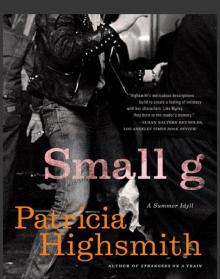 Small G: A Summer Idyll
Small G: A Summer Idyll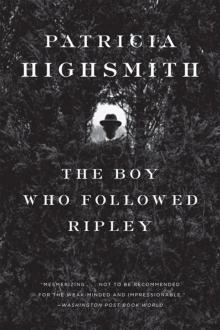 The Boy Who Followed Ripley
The Boy Who Followed Ripley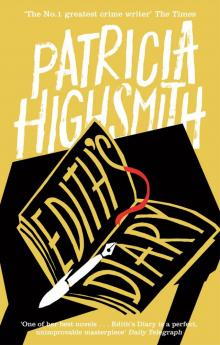 Edith's Diary
Edith's Diary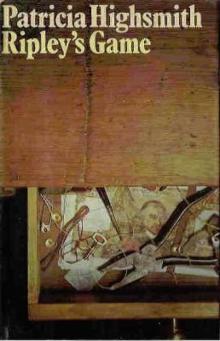 Ripley's Game
Ripley's Game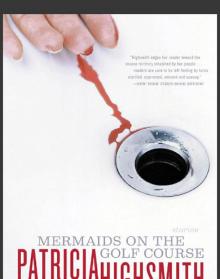 Mermaids on the Golf Course: Stories
Mermaids on the Golf Course: Stories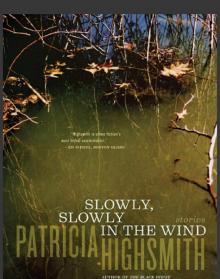 Slowly, Slowly in the Wind
Slowly, Slowly in the Wind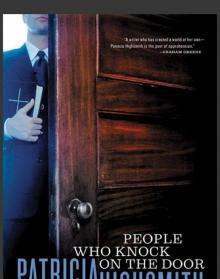 People Who Knock on the Door
People Who Knock on the Door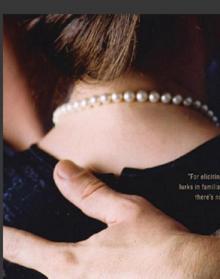 The Glass Cell
The Glass Cell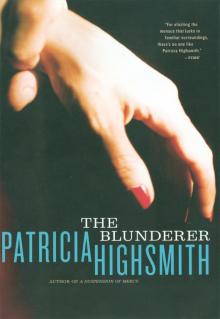 The Blunderer
The Blunderer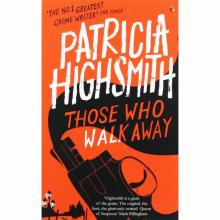 Those Who Walk Away
Those Who Walk Away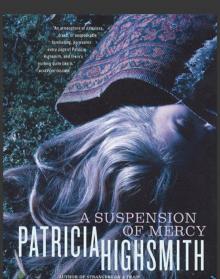 A Suspension of Mercy
A Suspension of Mercy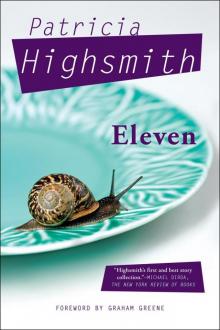 Eleven
Eleven Found in the Street
Found in the Street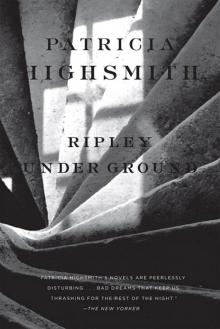 Ripley Under Ground
Ripley Under Ground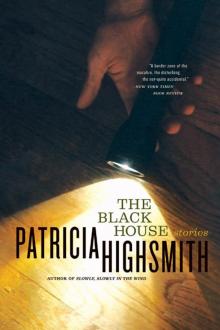 The Black House
The Black House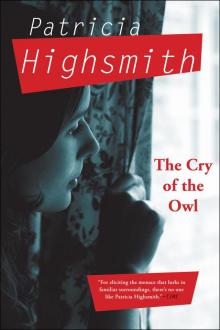 The Cry of the Owl
The Cry of the Owl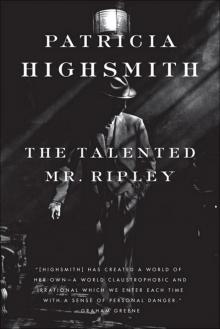 The Talented Mr. Ripley
The Talented Mr. Ripley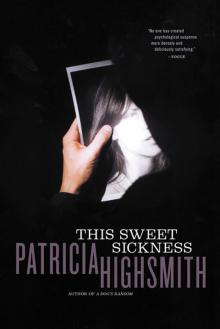 This Sweet Sickness
This Sweet Sickness The Two Faces of January
The Two Faces of January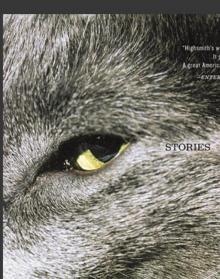 The Animal-Lover's Book of Beastly Murder
The Animal-Lover's Book of Beastly Murder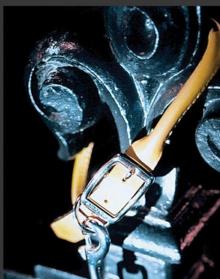 A Dog's Ransom
A Dog's Ransom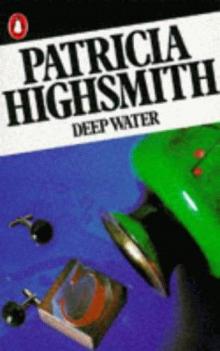 Deep Water
Deep Water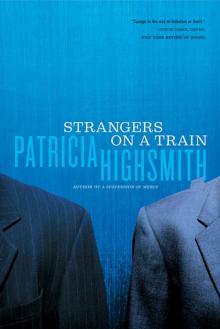 Strangers on a Train
Strangers on a Train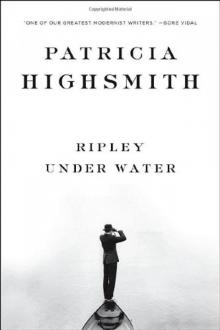 Ripley Under Water
Ripley Under Water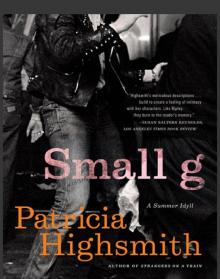 Small g
Small g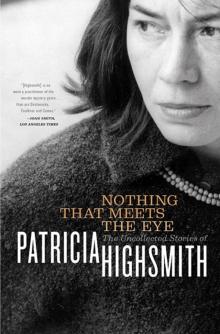 Nothing That Meets the Eye
Nothing That Meets the Eye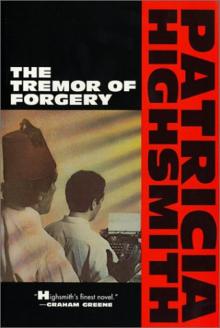 Patricia Highsmith - The Tremor of Forgery
Patricia Highsmith - The Tremor of Forgery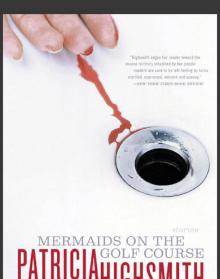 Mermaids on the Golf Course
Mermaids on the Golf Course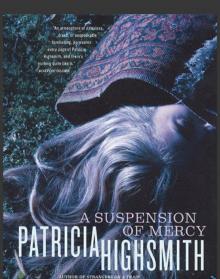 Suspension of Mercy
Suspension of Mercy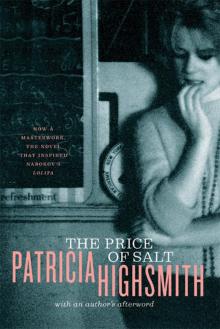 The Price of Salt, or Carol
The Price of Salt, or Carol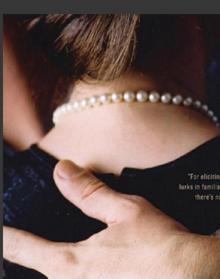 Glass Cell
Glass Cell